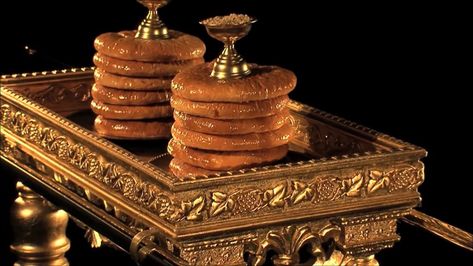“Put the bread of Presence on their table before Me at all times.”
(Exodus 25:30 NIV)
Of course, we wonder, what is the significance of the showbread?

The longer I linger in the texts of the tabernacle, the more I realize the symbolism tied to each furnishing and ornament. It turns out, scholars far smarter than I have wrestled with the same question about the bread carefully stacked on the golden table at the northern edge of the tabernacle tent. In an attempt to understand, I’ve made a few observations.
“Take the finest flour and bake twelve loaves of bread, using two-tenths of an ephah for each loaf. Arrange them in two stacks, six in each stack, on the table of pure gold before the Lord. By each stack put some pure incense as a memorial portion to represent the bread and to be a food offering presented to the Lord. This bread is to be set out before the Lord regularly, Sabbath after Sabbath, on behalf of the Israelites as a lasting covenant.”
(Leviticus 24:5-8 NIV)
We know for sure that the Shewbread or Bread of Presence was an ongoing memorial before the Lord. It seems like it represented people; twelve loaves for twelve tribes. The bread was replaced weekly; restored by the Sabbath just as God’s people are. The twelve loaves had an expiration date, but as soon as it expired it was replaced. Though the people of God wore out and expired, God continued to replenish the tribes. Jewish legend states that the bread stayed hot and fresh, a nod to God’s miraculous provision and generosity to His people. Each loaf weighed eleven pounds; quite heavy for a loaf of bread, yet the loaves did not crush each other or give way to mold when stacked for a full week. The twelve tribes were large and the burden of sustaining them was great, yet they did not destroy each other. Every tribe was represented throughout Israel’s history, even in seasons of terrible sin, God’s grace remained upon His people. Perhaps the bread also reminded God’s people that man could not live on bread alone; something far greater sustains us.
Maybe the most important thing about the Shewbread was the fact that it was continually before the Lord; right there in His house where He could see it always. God set a memorial in His living room to let us know that He would never, could never forget His people. In fact, three times a year, golden poles were inserted into the gold adorning rings and the whole dinner table was taken on a tour through the tribes while the priests declared: “Look at how beloved you are by God!”
How do we respond to that? To such extravagant attention and provision? I feel there is only one appropriate reply: we set the Lord continually before us. We make markers within the walls of our own lives that lift our eyes toward Him over and over again. We recall and delight in His ongoing and daily provision.
“I have set the Lord always before me: because He is my right hand, I shall not be moved.” (Psalm 16:8 KJV)
Lord, we are so grateful for Your Presence and Provision. Thank You for keeping us continually in front of You. Help us to respond in kind. Amen.